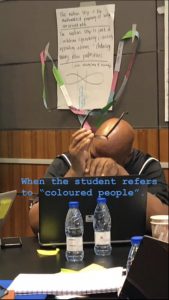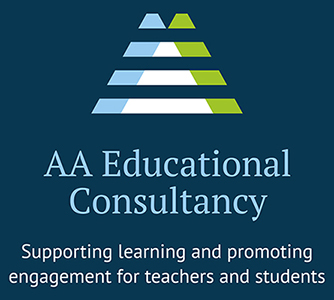
I would be lying if I said I have not experienced awkward moments when talking about race with students or teachers, or even family members. I raised my white children (in a predominantly white society) with multi-cultural crayons and dolls from different cultures and backgrounds, but looking back now this feels almost like an academic pursuit rather than a real-life experience. I would also be lying if I said that I do not have very strong feelings about the issue and how we approach it in our classrooms. And I would be lying if I said that I have definitive answers to the question “how do we talk about race in the literature classroom?” That became obvious when we listened to a student’s discussion of the issue at my workshop in Doha a couple of weeks ago. The poor student was not managing that well, and then she hit the “coloured people” high point.
I am glad I was quick enough to capture GLC Jr’s reaction: something between desperation and agony, fatigue and incomprehension, shock and frustration? All of the above? None of the above, but something only he experiences and I cannot have access to? Whatever it was, it reminded me that it is very tempting to focus on the individual reaction and miss the wider political and historical issue that the discussion about race introduces into our teaching of literature, and a political and historical issue entails a social issue, and a social issue entails an economic issue.
Then there is political correctness and all the backlash this has brought upon us, when its opponents forget that language reflects, represents, creates and shapes our reality. However, this reality becomes the present upon which our students will build a future, is it not? In addition to this backlash, there is the well-intentioned colour-blindness that students sometimes gravitate towards, as if in a misinterpreted 60’s throwback of some sort. Eventually, this semi-humanistic approach often becomes a “compendium of meaningless platitudes” (my favourite phrase from last week’s British political debate, credit to John McDonnell; whatever one thinks about British politicians these days one has to admire their creative use of the English language). Having run out of platitudes and a lot of misinformation about the race issue in the US, the student resorted to “coloured people”. And it was not her fault. But it is her problem. And ours.
So where does one begin?
Contextualise the issue of race in its geographical, historical, social and political dimensions. Talking about race in different parts of the world will allow for an understanding of the different perspectives but also give students the opportunity to see the patterns and appreciate the shared ‘logic’ and mechanisms behind it.
Be brave and courageous and discuss the issue of institutionalised racism, how it has emerged, why, and how it has come to be accepted.
Create a safe environment where students can probe into personal attitudes first in order to reach the political implications of these attitudes. Opening this Pandora’s box may also take you down some other very interesting paths, like women’s issues and LGBTQ+, not to mention immigration, emigration, migration and refugees.
Help students resist cynicism and complacency. In my opinion, a sense of idealism is a quintessential 21st century learning skill. Complementing it with an understanding of our world and the existing and emerging inequalities therein is our only hope for a sustainable and peaceful future.
Bridge older voices with current ones and challenge the approach that “we have come a long way with issue x,y,z since 18xx or 19xx”. We all have/had a dream. Now let’s see what’s become of it. There is a wealth of sources, speakers, writers, journalists, essayists, poets, musicians out there for teachers to choose from, depending on their context and their syllabi. Here are my non-fiction suggestions, based solely on my most recent readings:
- Anything by Ta-Nehisi Coates. His congressional testimony in June 2019 on the case of reparations can also be found on YouTube. Speaking of reparations, Glasgow University owned up to wealth from slavery in 2018. What do we talk about when we talk about reparations?
- Natives by Akala. His memoir or his music or both.
- Why I’m No Longer Talking to White People About Race by Reni Eddo-Lodge. There is a Long Read available, if your syllabus is getting too full.
This post is dedicated to the wonderful group of participants at my English A Language&Literature QF workshop from August 30 to September 1, 2019. GLC Jr has had to have his hand surgically removed from his face, but he is doing well.
Peace and love!
